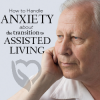The first day of any major lifestyle transition – whether it’s the first day of school or starting a new job – can be stressful and nerve-wracking. Moving into an assisted living center is no different. For many people, emotions are arguably intensified, because they’re transitioning from a long-time private residence to a new communal living situation later in life. Once the process of finding the right facility and packing up your loved one’s home is over, you might feel ready to make the move, but he or she could be experiencing difficult first-day jitters. Use these techniques to ease your relative’s nerves and help him or her feel comfortable and at home.
“Get a sense of what they’re going through.”
Understanding the transition
Before you can help your loved one, you have to get a sense of what he or she is going through. So many thoughts are running through his or her mind throughout the entire process, and all of them may come to the surface on the day of the move. Here are some of the most common concerns for people about to make the switch to assisted living:
- After living in a house or apartment with ample space for the majority of their lives, they’re likely concerned about downsizing.
- They want to make a good impression on the people they’ll be living alongside, especially if they don’t know anyone at their assisted living center.
- If they lived alone, they could be struggling with a perceived loss of independence, noted AssistedLiving.com.
- They may have concerns about adjusting to new routines.
In addition to these general concerns, every person has individual issues he or she may be dealing with. Perhaps your father is having a particularly hard time parting with his extensive book collection, or your mother is growing anxious about moving farther away from her grandchildren. Think about your loved one’s unique situation to get a better handle on what he or she may be going through.

The first day in an assisted living facility can be a nerve-wracking experience.
How you can help
According to Caring.com, there are a variety of ways you can make the first day easier for your loved one.
- Take your relative shopping a few days before the move and help him or her pick out an outfit that inspires both comfort and confidence. If your loved one feels good, he or she will be more likely to strike up conversations with fellow residents.
- If your relative starts to judge the center right away, remind him or her to take it slow and not rush to any negative conclusions. Many concerns your loved one has will likely fall away as he or she gets acclimated.
- Ask the living center ahead of time if they have a “buddy system” program, which pairs new residents with existing residents. If this option is not available, ask the facility if they could match your relative with a resident who could sit with him or her for the first few meals.
- For the very first meal, offer to stay and eat with your relative. It will give you a chance to get a better sense of how the facility operates, and you can assist your loved one in making new friends.
- Stay and help your relative unpack his or her new room, and don’t leave until it really looks and feels like home. Make sure all the boxes and moving equipment have been removed, make the bed and arrange items the way they were set up at your loved one’s previous home. Even just arranging toiletries in a familiar fashion can go a long way toward creating a sense of comfort and normalcy.
When it’s more than just jitters
Being nervous about the move is to be expected, but what if your loved one seems profoundly unsettled and worried? A Place for Mom explained that seniors are often more susceptible to developing anxiety disorders for a number of reasons. Not only are they changing their living situations, but they’ve probably also experienced many losses and may be dealing with illnesses or medications that exacerbate anxious feelings. It can be tempting to dismiss these feelings of uncertainty or panic as moving nerves, or even just label them elderly issues, but it’s important to observe your loved one’s behavior and check in regularly to make sure he or she is feeling more comfortable at the new residence.
If it seems as though your relative’s emotional health isn’t improving, it’s a good idea to connect him or her with a health care professional who may be able to offer a diagnosis. A Place for Mom noted that the following illnesses are common throughout the elderly community:
- Obsessive compulsive disorder
- Phobias
- Acute stress disorder
- Post-traumatic stress disorder
- Social anxiety
- Panic attacks
- Generalized anxiety disorder.
If you found an error, highlight it and press Shift + Enter or click here to inform us.



